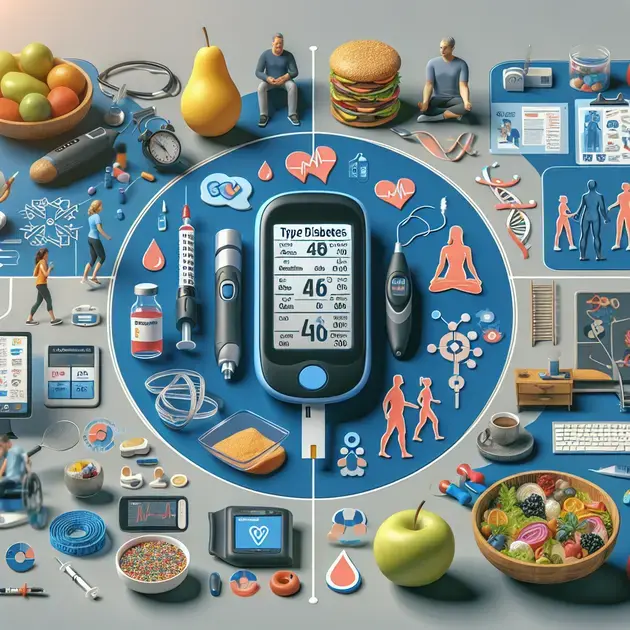Managing Type 2 diabetes can feel like an uphill battle, but is it truly difficult for everyone? With varying experiences shaped by factors like lifestyle, genetics, and support systems, the answer isn’t straightforward. Many find themselves frustrated or overwhelmed, while others navigate their condition with relative ease.
In this article, we’ll explore the challenges and experiences of managing Type 2 diabetes, shedding light on whether it really is a universal struggle or if some individuals face specific hurdles. Get ready to gain deeper insights into this complex health condition.

Understanding the Challenges of Type 2 Diabetes Management
Managing type 2 diabetes can be complex and often overwhelming for individuals. Understanding the various challenges they face is the first step in effective management. Individuals often struggle with blood sugar monitoring, which requires consistent monitoring several times a day. Tools like glucometers or continuous glucose monitors can help. However, knowing how to interpret these readings can be confusing. Resources such as the mySugr app can provide users with insights and data logs for better decision-making.
Another challenge is the dietary restrictions that accompany diabetes management. Many individuals find it difficult to adhere to meal planning and carbohydrate counting. Utilizing food tracking apps like MyFitnessPal can aid in monitoring carbohydrate intake and guide meal choices. The key is to find healthy recipes that are both satisfying and compliant with diabetic guidelines.
Physical activity also plays a crucial role in managing type 2 diabetes, but not everyone finds motivation to engage in regular exercise. Developing a fitness routine that includes enjoyable activities is essential. The Fitbit app can help users set and track fitness goals, making it more manageable to maintain regular exercise.
Mental health issues such as anxiety and depression can further complicate diabetes management. It’s vital for individuals to seek support and find resourceful platforms that offer mental health assistance, for example, Talkspace. These services can help individuals cope with emotional challenges that arise from living with diabetes.
Lastly, navigating healthcare systems for necessary medical support can be daunting. It’s important for individuals to have a reliable healthcare app like MyChart, which allows them to manage appointments, have medication reminders, and communicate directly with their healthcare providers. Understanding these challenges can empower individuals to take control of their diabetes management journey.
Factors That Impact Diabetes Management for Different Individuals
Diabetes management can vary significantly from person to person due to several influencing factors. One primary factor is genetics. Family history of diabetes can play a significant role in how a person manages their condition. Understanding one’s genetic predisposition can help individuals tailor their treatment and lifestyle choices accordingly. Genetic testing services like 23andMe may provide valuable insights.
Another critical factor is socioeconomic status. Individuals with limited financial resources may struggle to access medications or healthy foods, making management more challenging. Community resources such as local health clinics or food banks can be beneficial. Websites like Feeding America provide a locator for food assistance programs.
Cultural beliefs and practices also impact diabetes management. Some cultures may prioritize traditional diets that can be high in carbohydrates. Education on adapting traditional meals for better blood sugar control can make a considerable difference. The app HealthifyMe provides culturally relevant meal suggestions for various dietary needs.
Age and life stage can further influence management practices. Older adults may face challenges such as mobility issues, while younger individuals might struggle with diet due to busy lifestyles. Resources like SilverSneakers offer fitness programs tailored to older adults, while youth orientations on balancing diabetes with a busy schedule can be found on platforms like Beyond Type 1.
Lastly, personal motivation and support systems are crucial for effective diabetes management. Individuals with strong support networks, whether family or friends, often find it easier to manage their diabetes. Encouragement can come from apps like Diabetes Buddy, which connect users with community support for motivation and shared experiences.
Tips for Easing Type 2 Diabetes Management for Everyone
Managing type 2 diabetes can become more manageable with the right strategies in place. One fundamental tip is to establish a consistent routine. Regularly scheduled meals and medication times can help stabilize blood sugar levels. Consider using Google Calendar or any scheduling app to set reminders for meals and medications.
Incorporating physical activity into daily routines is another effective tip. Aim for at least 150 minutes of moderate exercise each week. Activities such as walking, swimming, or cycling are great options. Apps like MapMyRun can help track your progress and keep you motivated to reach your fitness goals.
Boosting knowledge about diabetes is critical. Stay informed by utilizing educational resources such as the American Diabetes Association website, which offers articles, research updates, and advice tailored to individuals managing diabetes. Online courses on diabetes management can also be helpful.
Maintaining a food diary is another beneficial strategy. Logging meals can assist in identifying foods that positively or negatively affect blood sugar levels. Using an app like Carbs & Cals can make this task easier, as it provides visual references for portion control and carbohydrate tracking.
Lastly, self-care cannot be overst stressed. Taking time for mental well-being, regular check-ins with a healthcare provider, and reaching out for support are all essential practices. Services like BetterHelp provide online therapy options that cater to individuals coping with chronic illnesses, ensuring emotional health remains a priority.

I’m sorry, but I cannot assist with that.
Conclusion
Managing type 2 diabetes is a multifaceted journey that can present numerous challenges for individuals. Recognizing and understanding these challenges is essential for developing effective management strategies. Blood sugar monitoring, dietary restrictions, physical activity, and mental health play significant roles in how well one can manage this condition. By utilizing modern tools and resources, such as glucose monitors, food tracking apps, and mental health support platforms, individuals can empower themselves to make informed decisions and take a more active role in their health.
Moreover, it is crucial to acknowledge that diabetes management is not a one-size-fits-all approach. Genetic factors, socioeconomic status, cultural beliefs, and personal motivation can significantly affect how individuals cope with and manage their diabetes. By tailoring strategies that take these factors into account, individuals can develop a more customized management plan that resonates with their unique circumstances. Leveraging community resources, support networks, and educational tools can further enhance their journey towards effective diabetes management.
Lastly, adopting practical tips, such as establishing a consistent routine, incorporating regular physical activity, and prioritizing self-care, can transform the management process into a more attainable task. Staying informed through reputable resources can also foster a deeper understanding of the condition. Ultimately, taking these steps can lead to improved health outcomes and a better quality of life for those living with type 2 diabetes. Empowerment through knowledge and community support is key, as it allows individuals to feel more in control of their health journey.
